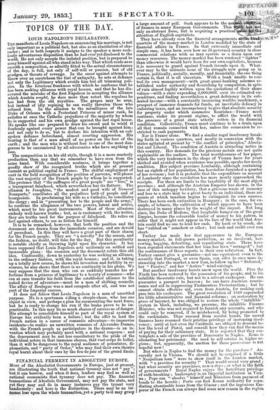TOPICS OF THE DAY.
LOUIS NAPOLEON'S DECLARATION.
TfiE manifesto of Louis Napoleon on announcing his marriage, is not only important as a political fact, but also as an elucidation of cha- racter; and in both respects it assigns to the speaker a more reck- lessly adventurous disposition than he had ever yet disclosed to the world. He not only accepts the isolated position, but is prepared to array himself against all who stand inhis way. That which reads as so smooth a composition, so adroitly fitted to the actual circumstances of the day, is full, not only of self-will or passion, but of old grudges, or threats of revenge. In the sneer against attempts to throw over an escutcheon the tint of antiquity, he sets at defiance not only the Legitimacy which avoids him but all trimming poli- cies. In the ferocious frankness with which he confesses that he has been seeking alliances with royal houses, and that he has dis- covered the mistake of the first Napoleon in accepting the alliance which Austria sought, he does more than retort the repulses he has had from the old royalties. The grapes may be sour, but instead of idly repining. he can really threaten those who refused him. In the allusion to the mesalliance of the late Duke of Orleans with a Protestant Princess of minor rank, he satisfies at once the Catholic prejudices of the majority by whom he is supported and his own grudge against the last regal house. He speaks like one prepared to draw his sword and to wield it fearlessly against every power that can be brought against him ; and not only to do so, but to declare his intention with an out- spoken defiance beforehand, almost courting aggression. His bearing is that of a man afraid of no power on the face of the earth ; and the man who is without fear is one of the most dan- gerous to be encountered by all adversaries who have anything to lose.
The composition is in his old style, though it is a more masterly production than any that we remember to have seen from the same hand. With considerable neatness, it brings together a goodly show of the recognized truths which are at present current as political capital in France. The skilful employment of cant in the bold recognition of the position of parvenu, will please the vast majority of the French people by whom he is supported. The pretence that " the suffrages of a great people " are " free," is a transparent falsehood, which nevertheless has its flattery. The allusion to Josephine, "the modest and good wife of General Bonaparte," conciliates all the prejudices both of people and of bourgeoisie. In proclaiming his wife as a Catholic, he conciliates the clergy ; and in " presenting her to the people and the army," he confirms the allegiance of the two powers, latent and active, which must be his great instruments. Most of these allusions embody well-known truths ; but, as is customary with the writer, they are truths used for the purpose of falsehood. He relies on fact against others, to use as fiction for himself. It is to be remarked, however, that both the position and the document are drawn from the immediate occasion, and are devoid of precedent. In this they will have a great part of their charm for the French people. They are " a novelty" for the season, and the fashion, no doubt, will take for the day. But this peculiarity is notable chiefly as throwing light upon his character. It has been supposed that Louis Napoleon acts uniformly on settled and inexorable plans : the occasion and the document refute this old idea. Confessedly, down to yesterday he was seeking an alliance, in the ordinary fashion, with the royal houses; and if, in taking up a totally new course, he shows his invention and fertility in re- sources, he also shows that there is no continuity in his plans. We may suppose that the man who can so suddenly transfer his af- fections from a princess of legitimacy to a beauty of romance—who can at once transfer his faith from the established alliance to the naked device of adventure—must be a man of shifting councils. The affair of Boulogne was a mad escapade after all, and was not part of the Imperial success. It does not follow that Louis Napoleon is a man of unsettled purpose. He is a sportsman riding a steeple-chase, who has one object in view, and perhaps a plan for surmounting the next fence, but he is ready to change his run if the brake prove to be im- practicable. In this may lie as much chance of success as of danger. His attempt to consolidate himself as part of the royal system of Europe has evidently been a failure ; but the offer to lead the French nation in a career of romantic adventure—to improvise incidents—to realize an unwritten romance of Alexandre Dumas, with the French people as participators in the drama—is an in- vention which may probably meet with a national response : and the denouement may be not less conciliatory to the pride of the individual actors in that immense chorus, that vast corps de ballet, than it will be dangerous to the royal audience of potentates, di- plomatists, and party of Order," who may find their own theatre royal burnt about their ears by ihe fen-de-joie of the grand finale.


























 Previous page
Previous page